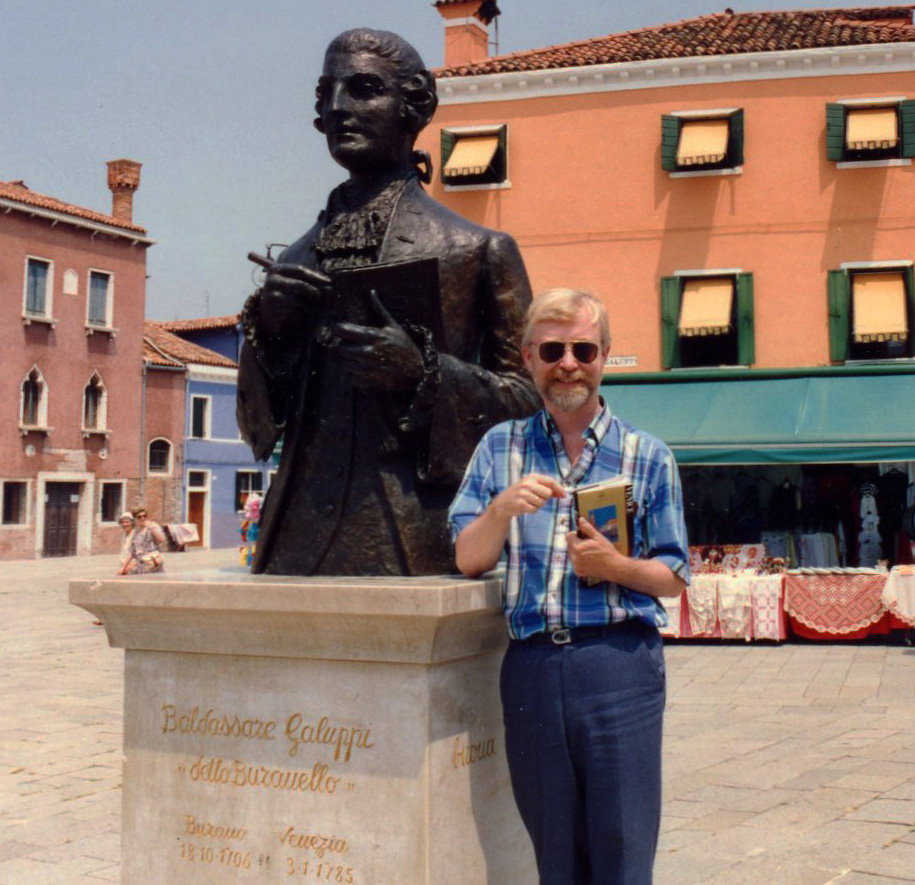Baldassare Galuppi (1706-1785):
1. Adagio from the
Sonata in D major
2. Sonata in C minor
3. Sonata in A minor: Largo
4. Allegro
5. Sonata in A minor: Siciliana
6. Allegro
7. Sonata in A major: Andantino
8. Allegro
9. Sonata in C minor: Larghetto,
Allegro
10. Andante from the Sonata No. 5 in C major
Erik Satie (1866-1925):
11. Petite Ouverture à
danser
12. Gnossienne No. 5
13. Gnossienne No. 6
14. Prélude de la Porte Héroique
15. Pièces Froides: Airs à faire
fuire (“Airs that chase away”) I
16. Pièces Froides II
17. Pièces Froides III
Cover photo: Barry with the statue of Galuppi
on the island of Burano, his birthplace, 1994.
Listen to complete Galuppi and Satie streams
here.
Program Notes:
It is one of the ironies of music history that the
Baroque Venetian composer, Baldassare Galuppi, was
regarded as one of the most famous composers in Europe
during the 18th century, renowned for his operas and
keyboard works, but quickly fell into obscurity with
the rise of Romanticism, whereas Erik Satie, a hundred
years later was mainly known only in Paris during his
lifetime, but today is famous worldwide. Both were
incredibly innovative keyboard composers living at the
cusp of changing musical styles.
One of Galuppi’s keyboard sonatas, including the
exquisite Andante in C major, was revived by Arturo
Benedetti Michelangeli on an LP in 1965 that I
happened to win as a teenager in a CBC radio
competition, and it has stayed with me ever since.
Since then only a few pianists have recorded any of
Galuppi’s more than 100 sonatas on the piano (an
instrument one of them reports as being indicated on a
Galuppi manuscript as “per il Pianoforte”). Galuppi
must have been impressed by the sustaining power of
the then new instrument, compared with the
harpsichord, but paradoxically most contemporary
performers play the allegro movements extremely fast,
and record them in an empty concert hall. In my
opinion, they work much better at a slower tempo (here
recorded in our living room) that brings out
individual voices, combined with the traditional
Baroque keyboard ornamentation, especially on the
repeats. Unlike most other pianists, I also emphasize
the remarkable emotional outbursts in the scores –
fuoco passages going straight to dolce – that look
forward to Beethoven. There is even an amazingly
dissonant “bell ringing” passage in the A major sonata
(at 4:22 and 6:24) as if his writing was interrupted
by the local churchbell. Whatever the interpretation,
Galuppi never fails to delight with his endlessly
innovative musical ideas.
As you will remember from my previous CDs, Erik Satie
has always been a favourite keyboard composer of mine.
And back in the 1970s, I was inspired by Reinbert de
Leeuw’s amazingly slow recordings of his early, and
most popular, piano works issued on Philips, and still
available on CD and YouTube. These too bring out the
inner voices and unexpected harmonic changes that were
Satie’s innovation. Ironically, de Leeuw performs the
very strangely evocative
Pièces Froides very
fast, but I maintain my traditionally slower tempi as
before.
So, in conclusion I hope you will enjoy the
‘encounter’ between these two amazing composers as I
have interpreted them.
Enjoy!
Barry

